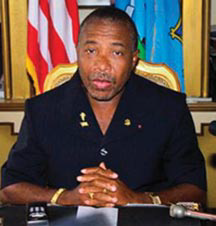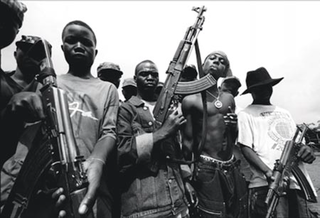
Liberia is a country in West Africa founded by free people of color from the United States. The emigration of African Americans, both freeborn and recently emancipated, was funded and organized by the American Colonization Society (ACS). The mortality rate of these settlers was the highest among settlements reported with modern recordkeeping. Of the 4,571 emigrants who arrived in Liberia between 1820 and 1843, only 1,819 survived (39.8%).

Charles McArthur Ghankay Taylor is a Liberian former politician and convicted war criminal who served as the 22nd president of Liberia from 2 August 1997 until his resignation on 11 August 2003 as a result of the Second Liberian Civil War and growing international pressure.
The Krahn are an ethnic group of Liberia and Ivory Coast. This group belongs to the Kru language family and its people are sometimes referred to as the Wee, Guéré, Sapo, or Wobe. It is likely that Western contact with the Kru language is the primary reason for the development of these different names.

Prince Yormie Johnson is a Liberian politician and former warlord who has served as a senator for Nimba County since 2006. A former rebel leader, Johnson played a prominent role in the First Liberian Civil War.

The Liberians United for Reconciliation and Democracy (LURD) was a rebel group in Liberia that was active from 1999 until the resignation of Charles Taylor ended the Second Liberian Civil War in 2003. While the group formally dissolved after the war, the interpersonal linkages of the civil war era remain a key force in internal Liberian politics.

The First Liberian Civil War was the first of two civil wars within the West African nation of Liberia which lasted between 1989 and 1997. President Samuel Doe's regime of totalitarianism and widespread corruption led to calls for withdrawal of the support of the United States, by the late 1980s. The National Patriotic Front of Liberia (NPFL) led by Charles Taylor invaded Liberia from the Ivory Coast to overthrow Doe in December 1989 and gained control over most of the country within a year. Doe was captured and executed by the Independent National Patriotic Front of Liberia (INPFL), a splinter faction of the NPFL led by Prince Johnson, in September 1990. The NPFL and INPFL fought each other for control of the capital city, Monrovia and against the Armed Forces of Liberia and pro-Doe United Liberation Movement of Liberia for Democracy. Peace negotiations and foreign involvement led to a ceasefire in 1995 but fighting continued until a peace agreement between the main factions occurred in August 1996. Taylor was elected President of Liberia following the 1997 Liberian general election and entered office in August of the same year.

The Second Liberian Civil War was a civil war in the West African nation of Liberia that lasted from 1999 to 2003.
The United Liberation Movement of Liberia for Democracy (ULIMO) was a pro-government militia that participated in the First Liberian Civil War (1989–1996).
The National Patriotic Front of Liberia (NPFL) was a Liberian rebel group that initiated and participated in the First Liberian Civil War from 24 December 1989 – 2 August 1997. The NPFL emerged out of rising ethnic tensions and civil unrest due to the Liberian government that was characterized by totalitarianism, corruption, and favoritism towards ethnic Krahns. The NPFL invaded Liberia through Ivory Coast’s border with Nimba County in Liberia under the direction of Charles Taylor, a former Liberian politician and guerrilla leader who served as the 22nd president of Liberia from 2 August 1997 until his resignation on 11 August 2003.
The Liberia Peace Council (LPC) was a rebel group that participated in the Liberian Civil War under the leadership of George Boley.
AlhajiGarxim Varmuyan Kromah was a Liberian journalist and later warlord and leader of the ULIMO faction during the First Liberian Civil War. He was a Muslim and member of the Mandingo ethnic group from Tusu Town, Quardu Gboni District, Lofa County. He attended St. Patrick's High School (1973).
The Lofa Defense Force (LDF) was a rebel group that participated in the Liberian Civil War.
Sekou Damate Conneh, Jr. is a Liberian politician and former rebel leader.
A new civil war began in 1999 when a rebel group backed by the government of neighboring Guinea, the Liberians United for Reconciliation and Democracy (LURD), emerged in northern Liberia. By the spring of 2001, they were posing a major threat to the Taylor government. Liberia was now engaged in a complex three-way conflict with Sierra Leone and the Guinea Republic. By the beginning of 2002, both of these countries were supporting the latest addition to the lexicon of Liberian guerrilla outfits – Liberians United for Reconciliation and Democracy (LURD), while Taylor was supporting various opposition factions in both countries. By supporting Sierra Leonean rebels, Taylor also drew the enmity of the British and Americans.
Joshua Milton Blahyi, better known by his nom de guerre General Butt Naked, is a Liberian evangelical preacher, writer and former warlord best known for his actions during the First Liberian Civil War. During the conflict, Blahyi led a group of soldiers which fought on the side of anti-rebel group United Liberation Movement of Liberia for Democracy (ULIMO) before converting to Christianity and becoming a pastor in 1996.

Jucontee Thomas Woewiyu, also known as Tom Woewiyu or Thomas Smith, was the former leader of the National Patriotic Front of Liberia (NPFL), with Charles Taylor.

The Monrovia clashes in 1998 were the result of Liberian President Charles Taylor's attempts to violently eliminate one of his last domestic political opponents, Roosevelt Johnson, a former warlord. At the time, Johnson still lived with a small loyal militia in Monrovia, the capital of Liberia. After some minor armed altercations, almost all of Johnson's followers were finally killed by Taylor's security forces during a major firefight in September 1998, though Johnson himself managed to flee into the United States embassy. After one last attempt by Taylor's paramilitaries to kill him there, causing a major diplomatic incident, Johnson was evacuated to Ghana. Although the clashes were effectively a political victory for Taylor as he had removed Johnson from Liberia, the mass killings of ethnic Krahn after the clashes contributed to the outbreak of the Second Liberian Civil War which saw the president being toppled.

Mohammed Jabbateh, also known by his nom de guerre Jungle Jabbah, is a Liberian war criminal and former United Liberation Movement of Liberia for Democracy (ULIMO) and ULIMO-K commander who was convicted in the United States of lying to immigration authorities about his role in the First Liberian Civil War (1989-1997) when he sought asylum in the late 1990s. He was arrested in April 2016. On October 18, 2017, Jabbateh was tried and convicted in Philadelphia of two counts of fraud in immigration documents and two counts of perjury stemming from false statements he made when filing for asylum and permanent residence. He was sentenced to 30 years in prison the following April, the statutory maximum allowed. Jabbateh was the first person convicted of crimes stemming from war-related activities during the First Liberian Civil War. He lost his appeal in September 2020.
Kunti Kamara, a.k.a. Kunti Kumara, Kunti K., Colonel Kamara, CO Kamara or Co Kamara, whose real name may be Awaliho Soumaworo, is a former Liberian rebel militia commander who participated in the First Liberian Civil War as a leader in the United Liberation Movement of Liberia for Democracy (ULIMO).

The Liberia national transitional government was a provisional government, or rather the name given to three successive governments, in Liberia formed in the midst of the First Liberian Civil War. The LNTG was product of the July 25, 1993, Cotonou Peace Accord, whereby the Interim Government of National Unity disbanded. The respective LNTG-I, LNTG-II and LNTG-III governments were differentiated by being led by three different chairpersons. Initially supposed to last for six months to allow for disarmament of warring factions and preparations of national elections, the LNTG timeline lasted until mid-1997. Various of the warring factions had direct participation in the LNTG and civilian elements were gradually sidelined. Through participation in the provisional governance of LNTG the different warlords could gain access to state resources, even in situations when armed hostilities continued. The LNTG period ended with the 1997 Liberian general election whereby Charles Taylor was elected President of Liberia.









